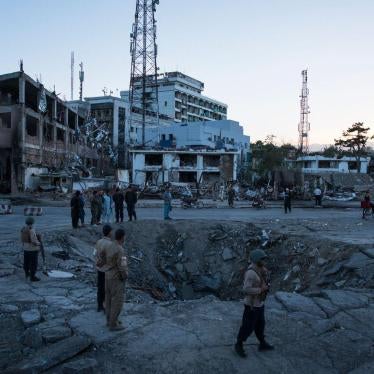(London) - Human Rights Watch today called on the European Union to resist China's call to end the E.U. embargo on arms sales to China, in place since shortly after the bloody crackdown on demonstrators in and around Tiananmen Square in Beijing on June 4, 1989. China claims that human rights issues are unrelated to the arms embargo and should not be considered by the E.U.
“China made human rights the issue in 1989 when it deployed the army to kill unarmed protestors and jail hundreds, if not thousands, to preserve the power of the party,” said Brad Adams, Asia director of Human Rights Watch. “When people still risk imprisonment for simply speaking their minds or reporting the news, human rights is still very much the issue."
Human Rights Watch called on the E.U. not to let business interests trump its longstanding proclaimed commitment to human rights in China. "France and some other E.U. members have made it clear that their interest is commerce and they no longer want to let human rights stand in the way of making money," said Adams. "This is profoundly misguided."
Human Rights Watch praised the action of the German parliament in insisting that the embargo be retained, over the objections of Chancellor Gerhard Schroeder, who favored lifting the ban in order to allow German companies to win more contracts in China.
Human Rights Watch urged the E.U. not to make concessions in exchange for the release of a few prisoners who did not belong in prison in the first place. Instead the E.U. should insist on a general amnesty for all those jailed for all forms of peaceful protest in China. It should insist on new trials, attended by international observers, for all those convicted of crimes related to the 1989 demonstrations.
In addition, Human Rights Watch urged the E.U. to call for an independent investigation into the events surrounding the massacre. Fifteen years later, no one has been held publicly accountable for the decision to turn the army against the citizens of Beijing. There has been no independent investigation of the crackdown. No one knows how many were killed or injured, how many were imprisoned, or how many remain in prison.
All attempts to collect such information have been short-circuited through more arrests, more prison sentences, surveillance, and harassment. For example, Ding Zilin, a professor, whose bystander son was killed in June 1989 and who has led the movement to collect information about the events, has been detained several times or been confined to her home. She can no longer teach. Li Hai, a graduate student in philosophy in 1989 who joined the pro-democracy movement, spent almost nine years in prison on charges of "prying into state secrets" for trying to collect information about Tiananmen-related prisoners. Dr. Jiang Yanyong, who exposed the extent of the SARS epidemic in China, wrote a private letter to the Chinese leadership asking that the official verdict that the 1989 protestors were part of a counterrevolutionary rebellion label be rescinded. He has been subjected to "thought reform" and is now unable to leave home, have visitors, or use the Internet without special permission.
"What needs to be remembered is the reason the embargo was created in the first place," said Adams. "China's army turned its guns on its own people after receiving orders from the political leadership. There is no sign of the reforms necessary to make the E.U. comfortable that this won't happen again. If the ban is lifted, the next attack could be with weapons supplied by E.U. states."








